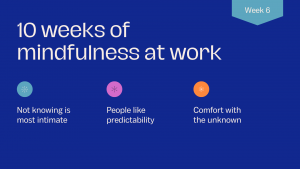10 Weeks of Mindfulness at Work
Welcome to week six of “10 Weeks of Mindfulness at Work” where you’ll discover simple tips and techniques to enrich your day with mindfulness. I hope you find inspiration from this series!
– Not Knowing is Most Intimate
One of the concepts in mindfulness is that “not knowing is most intimate”. What this means is that no matter what happens in life, the intent with mindfulness is to see clearly what’s happening in the present moment and not add more content to it with predictions about what’s next. After all, what’s next is unknown.
Now, this doesn’t mean not to plan for the future; however, it does mean not to live into an imagined outcome about a future that hasn’t yet unfolded. As Mark Twain famously said, “I’m an old man and have known a great many troubles, most of which never happened.”
– People Like Predictability
“Not knowing” seems like an easy enough concept, but it can be challenging to practice. As I wrote in last week’s post, people often fill in gaps of unknown information with stories; it gives them a sense of control and predictability in their lives.
Consider someone who just had a medical diagnostic test. The entire week before getting the test results back, they’re sure they have the disease they were being tested for. They find it impossible to concentrate at work, since they keep planning for a future with this medical condition. Maybe they have the condition; maybe they don’t – but before they get their results, they simply don’t know.
So, if you find you’re stressed about what’s next, notice if you’re making predictions about the future and remind yourself you don’t know. Will the diagnostic test come back positive? Remind yourself, “I don’t know and it’s ok not to know.” Will I be able to juggle work responsibilities and medical appointments? Remind yourself, “I don’t know and it’s ok not to know.”
Any time you want to make a prediction about what’s next, simply remind yourself that the future is unknown. Rather than fill in gaps of unknown information with predictions about what next, simply repeat the refrain, “I don’t know and it’s ok not to know.”
Because the reality is that we simply don’t know what the next month will bring, or even the next hour or the next minute.
Reflection: Have you ever reacted to an imagined future outcome that never actually happened?
WEEK SIX PRACTICE SUGGESTION: Notice if you’re making a prediction about a future outcome. Instead, can you embrace the unknown?
**99¢ Special
Be on the lookout for a 99¢ Kindle promotion in July to celebrate the 10th anniversary of “Meditation Illuminated: Simple Ways to Manage Your Busy Mind,” a step-by-step book for beginning meditators. Available in Kindle, paperback and audiobook.

